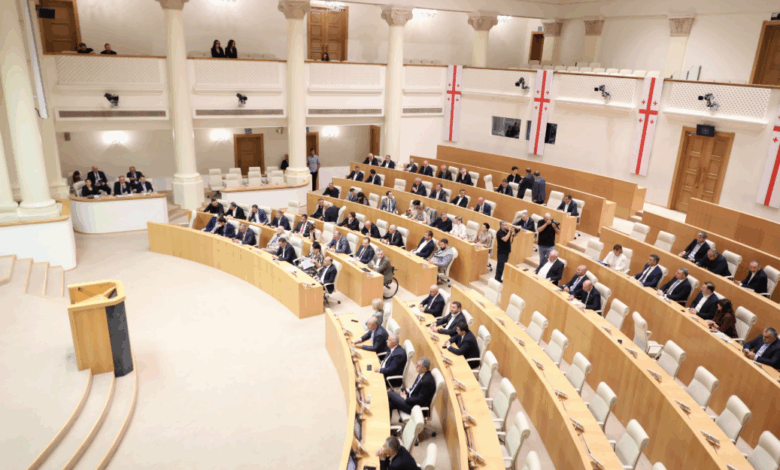
GD to Restrict Media Coverage in Courts, Double Judges’ Salaries
The Georgian Dream parliament is restricting photo, video, and audio recording at court premises, in a move critics say will limit public oversight of judicial proceedings. The broader bill also includes an almost twofold pay raise for judges, among other changes.
According to the draft amendments to the Organic Law of Georgia on Common Courts, which are being fast-tracked through the one-party legislature, photo, film, and video recording or broadcasting will be banned in courthouses, courtrooms, and courtyards — except when conducted by the court or a court-authorized person.
“These changes will severely restrict media work and effectively eliminate public oversight of the judiciary,” the Media Advocacy Coalition, a watchdog group, warned on June 24.
The changes come as criminal proceedings against those detained during the ongoing protests near their final stages, with many verdicts expected this summer. The trials, including police testimonies and defense arguments, have drawn broad public scrutiny. Photos and videos from hearings have widely circulated in the media, although journalists have repeatedly reported obstruction to their work in court.
“What we feared the most has happened,” said Mindia Gabadze, a photographer for the online outlet Publika who regularly covers court proceedings. “For us in the media, work in the courts has essentially been banned — and for us, photographers, it has been completely prohibited,” he wrote on Facebook.
The changes leave media at the mercy of the courts, which “may distribute photo, film, and video materials of the court proceedings in its possession, if this does not contradict the law,” the bill states. “Video or audio recording of a court proceeding will be permitted only upon a substantiated motion and a judge’s reasoned decision,” the document further notes.
Under the current law, Georgia’s Public Broadcaster is authorized to take photos, film, and record video or audio in courtrooms unless proceedings are closed, and is required to share the materials with other media outlets. If the Public Broadcaster does not exercise this right, other broadcasters may do so. The proposed bill repeals these provisions.
The current version of the law also permits photo, film, video, and audio recording, as well as live broadcasting, in courthouse halls and courtyards. It further prohibits the confiscation of personal items, including phones, laptops, or other recording devices, from individuals allowed inside court buildings. The proposed amendments abolish these provisions as well.
The bill’s explanatory note says these changes aim “to ensure effective exercise of the judiciary and not obstruct court proceedings,” while also “ensuring open proceedings.”
“We have seen in recent years that courtrooms have been deliberately turned into a circus,” Kakha Kaladze, Tbilisi Mayor and GD Secretary General, said, claiming the changes align with standards in “many” European countries and the U.S.
Salaries of Judges to Double
The amendments also introduce a significant pay raise for judges at all levels — from district courts to the Supreme Court — with salaries set to double.
Under the changes, fixed monthly salaries for judges will be scrapped. Instead, their pay will be tied to the state budget, using a base salary — currently GEL 1,460 — multiplied by a set rate, which is, for example, 7.2 for city court judges and 10 for the Supreme Court chair.
This means a city court judge, who now earns about GEL 4,000 (USD 1,470), will receive GEL 10,512 (about USD 3860). The Supreme Court head’s monthly salary will rise from GEL 7,000 (USD 2,570) to GEL 14,600 (about USD 5170) — the highest among judges.
Many Georgian judges have been sanctioned by Western countries. In 2023, the United States imposed the first sanctions on senior judges, including Mikheil Chinchaladze, now chair of the Tbilisi Court of Appeals and a former member of the High Council of Justice (HCoJ), and Levan Murusidze, currently on the HCoJ. Chinchaladze and Murusidze have also been sanctioned by the U.K. over “serious corruption.” Other judges, including some on Georgia’s Constitutional Court, have also faced sanctions from other Western nations, including the Baltic states, with the EU considering additional sanctions.
“The justice system seems to be part of this repression machine,” said EU High Representative and Vice President Kaja Kallas on Georgia at a press conference following the EU Foreign Affairs Council meeting in Brussels on June 23. “So there was also a discussion of putting sanctions on judges who are conducting these things,” she added.
On June 26, the GD Parliament adopted the amendments in the third and final reading, with 80 votes in favor and none against. The new rules will take effect once the GD-elected President Mikheil Kavelashvili signs them into law.
Note: This article was updated on June 26 at 17:45 to include the adoption of the amendments.
Also Read:
- 04/04/2025 – Kobakhidze Meets Judges, Blasts Foreign Sanctions
This post is also available in: ქართული